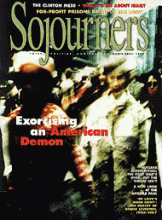CHARLES L. GLENN ("Expanded Choices," January-February 1998) is right in this: Our existing public school systems have better schools in more affluent neighborhoods, and parents choose those schools by buying houses there, usually paying premium prices. A system of school vouchers could eliminate this choice. But presently, concerned and informed parents want choice because the public schools are of widely varying quality. Should the quality vary?
The quality of a school is affected by the quality of its students, which in turn is affected by the quality of parental involvement in their education, and in the school directly. Poverty thus begets poverty. A voucher system as Glenn describes it might ration quality education more on the parents’ skills as consumers of education than on their financial resources alone. But would this improve the quality of education, or even make the choices more equal?
Some argue that vouchers will stimulate competition and result in better schools. Glenn wisely warns of "trusting market forces." Our present economy is relentlessly widening the gap between rich and poor. Will entrepreneurial schools not do the same?
The arguments Glenn makes so skillfully should convince us of one thing: We are providing education of widely divergent quality, often of poor quality, to too many of our children. Changing the method by which we ration education will not change that. But change that we must.
Read the Full Article
